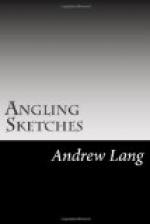Next to being an expert, it is well to be a contented duffer: a man who would fish if he could, and who will pleasure himself by flicking off his flies, and dreaming of impossible trout, and smoking among the sedges Hope’s enchanted cigarettes. Next time we shall be more skilled, more fortunate. Next time! “To-morrow, and to-morrow, and to-morrow.” Grey hairs come, and stiff limbs, and shortened sight; but the spring is green and hope is fresh for all the changes in the world and in ourselves. We can tell a hawk from a hand-saw, a March Brown from a Blue Dun; and if our success be as poor as ever, our fancy can dream as well as ever of better things and more fortunate chances. For fishing is like life; and in the art of living, too, there are duffers, though they seldom give us their confessions. Yet even they are kept alive, like the incompetent angler, by this undying hope: they will be more careful, more skilful, more lucky next time. The gleaming untravelled future, the bright untried waters, allure us from day to day, from pool to pool, till, like the veteran on Coquet side, we “try a farewell throw,” or, like Stoddart, look our last on Tweed.
A BORDER BOYHOOD
A fisher, says our father Izaak, is like a poet: he “must be born so.” The majority of dwellers on the Border are born to be fishers, thanks to the endless number of rivers and burns in the region between the Tweed and the Coquet—a realm where almost all trout-fishing is open, and where, since population and love of the sport have increased, there is now but little water that merits the trouble of putting up a rod.
Like the rest of us in that country, I was born an angler, though under an evil star, for, indeed, my labours have not been blessed, and are devoted to fishing rather than to the catching of fish. Remembrance can scarcely recover, “nor time bring back to time,” the days when I was not busy at the waterside; yet the feat is not quite beyond the power of Mnemosyne. My first recollection of the sport must date from about the age of four. I recall, in a dim brightness, driving along a road that ran between banks of bracken and mica-veined rocks, and the sunlight on a shining bend of a highland stream, and my father, standing in the shallow water, showing me a huge yellow fish, that gave its last fling or two on the grassy bank. The fish seemed as terrible and dangerous to me as to Tobit, in the Apocrypha, did that ferocious half-pounder which he carries on a string in the early Italian pictures. How oddly Botticelli and his brethren misconceived the man-devouring fish, which must have been a crocodile strayed from the Nile into the waters of the Euphrates! A half-pounder! To have been terrified by a trout seems a bad beginning; and, thereafter, the mist gather’s over the past, only to lift again when I see myself, with a crowd of other little children, sent to fish,




